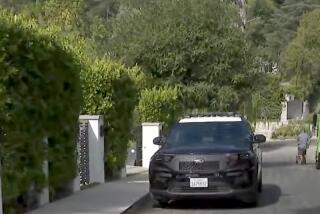Drop in San Fernando Valley homicides outpaces other L.A. regions
Los Angeles recorded another large drop in homicides in 2013, and nowhere has the trend been more pronounced than in the San Fernando Valley.
The Valley had 40 homicides this year, dropping 35% from 2012 — the biggest decline of any region in the city. As recently as 2006, the region recorded 87 homicides.
When it comes to falling crime, much of the focus has been on traditionally high-crime areas like South L.A. and the Eastside. But police officials and community leaders say the decline in violence in tough parts of the Valley, notably Pacoima, Lakeview Terrace, Sun Valley and Sylmar, has also been striking.
Homicide Report: Tracking killings in L.A. County
Pacoima resident Maurilio Torres, 52, remembers driving down the narrow residential streets crammed between Branford and Osbourne streets, seeing young men carrying guns out in the open. At the local parks, he saw teens being initiated into gangs. He told his children to avoid wearing dark clothes because someone could mistake them for gang members.
“That was scary, driving by with my kids and seeing these activities,” he said. “Slowly, it’s been changing. Now you can actually walk.... Now I go jogging up the street and back.”
Pastor Karl Cruz, of Victory Outreach church in Sylmar, measures the decline in killings a different way.
“There was a January once when I did 10 funerals in a month,” said Cruz, whose organization helps people get out of the gang life. “The deaths and shootings have declined so much, we’re now able to focus on the drug problem.”
Cruz points to another sign of falling crime: fewer LAPD helicopters flying overhead at night. “The ‘ghetto bird’ used to be the national bird of Pacoima,” he said, referring to the choppers. “You don’t hear it anymore. The sounds of silence is the sound of peace.”
Across Los Angeles, homicides this year are down 16% from 2012, and the city is on target to end 2013 with the fewest killings since 1966. The city recorded 250 homicides this year, as of Dec. 28, compared to 298 in 2012. Across the city, overall serious crime fell for the 11th straight year — down by 5%.
Crime in Los Angeles decreased across the board. Violent crimes declined by 12%, and property crimes declined by another 4%.The number of reported rapes in the city fell by a quarter compared to 2012.
The reduction in Los Angeles homicides is part of a long-term trend seen in America’s big cities —New York, Chicago and Houston also have recorded big drops in homicides.
The San Fernando Valley comprises a diverse array of communities, including affluent hillside neighborhoods like Encino, Studio City and Sherman Oaks, as well as working-class Latino areas such as Van Nuys and Panorama City. But officials say the bulk of the drop in homicides has occurred in the Northeast Valley, which has long suffered from gang problems.
LAPD Deputy Chief Jorge A. Villegas, who oversees the Valley Bureau, said the department has employed some of the same tactics proven successful in South L.A. in the Northeast Valley. Police use computer crime data to help determine where to place officers and detect crime patterns.
In the Foothill division in Northeast Valley, the number of homicides declined by nearly half to 10 in 2013. The number of people shot also dropped, from 52 to 32.
LAPD Capt. Sean Malinowski, who oversees the Foothill Division, said his strategy almost always begins with crime data. The walls of his office are lined with printouts of crime statistics and charts, and he and his team are always crunching numbers.
Sometimes, the statistics contradict conventional wisdom. Police generally believe crime spikes during the hot summer months. But Malinowski said the data showed that a spike actually occurs between August and October, so the division staffed the streets accordingly. The department put more police cruisers in tough neighborhoods as a show of force, and even got some California Highway Patrol units to join in.
Recently, Malinowski’s officers began a campaign to find weapons and received special training on how to locate hidden compartments in cars.
“Firearms seizures are up 58% this year with 234 weapons taken off the streets,” he said. “If you haven’t got a gun in your car, it makes it much more complicated to kill a rival you see on the streets.”
The LAPD also praises gang intervention groups, like the one Cruz runs, for helping to ease gang tensions. Malinowski said that when there is a major gang incident, he often calls Cruz for help and advice. The LAPD has also worked with a clergy council of local pastors to help with outreach.
Malinowski also cited an aggressive prostitution crackdown on Lankershim Boulevard. The LAPD targeted pimps, believing that would be the best way to reduce crime. More than 30 people were arrested during the operation, and Malinowski said several types of crime have gone down since.
“These are the people who drive the crime,” he said.
Residents say the drop in crime has changed the atmosphere in their neighborhoods.
As sisters Martha Rodriguez and Ariana Mancilla unloaded their cars in their driveway on Christmas Eve, nearly a dozen neighbors across Louvre Street were outside, making tamales on three folding tables.
Farther down the block, a man worked on his car.
Less than two years ago, the sisters said, the scene would have seemed impossible.
“We couldn’t even park our cars out there” out of fear that the car batteries would get stolen, the sisters said. They’ve watched helplessly as suspected gang members leapt from rooftop to rooftop trying to flee police.
“Every corner had its little crew,” Rodriguez said.
These days, the gangs have receded and there is a lot more police presence, she said.
There’s still crime, Mancilla said. “But we’ve seen a lot of difference.”
More to Read
Sign up for Essential California
The most important California stories and recommendations in your inbox every morning.
You may occasionally receive promotional content from the Los Angeles Times.











